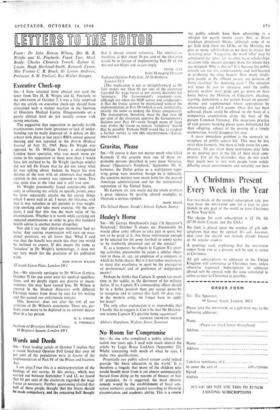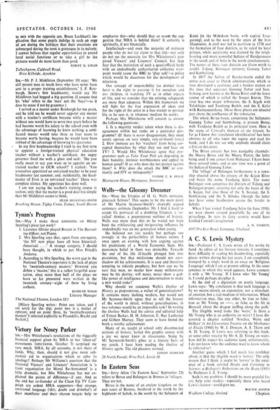No Room for Compromise
SIR,—As one who completed a public school edu- cation two years ago, I read with much interest the article by Logie Bruce Lockhart (September 23). Whilst concurring with much of what he says, I make two qualifications.
Potentially our public school system could indeed provide 'the finest education in the world.' It is therefore a tragedy that many of the children who would benefit most from it are almost automatically barred from doing so by reasons of finance or fear of prejudice. As is suggested, the most obvious remedy would be the establishment of local edu- cation authority grants, graded according to financial circumstances and academic ability. This is a course
the public schools have been advocating in a whisper for nearly twenty years. But, as Bruce Lockhart plaintively bleats. 'although some of us get little help from the LEAs, or the Ministry, we give as many scholarships as we dare to attract the deserving poor.' Frequently the word 'offer' may be substituted for 'give,' for so often these scholarships occasion little interest amongst those for whom they are designed. Why is this so? It is because the public schools are far too condescending and half-hearted in proffering the olive branch. How many intelli- gent people in the affluent society are desirous of being classified 'the deserving poor'? The situation will never be just or attractive until the public schools swallow their. pride and go down on their knees before the Ministry of Education, pleading, cajoling, demanding a fee system based on parents' income and supplemented where appropriate by scholarships and LEA grants. Once this has been achieved, places could be offered on the basis of a competitive examination along the lines of the present Common Entrance. The iniquitous practice of rich parents booking places years beforehand for their offspring, subject to the passing of a simple examination, would disappear for ever.
A more immediate problem is the monastic at- mosphere of public school life This may be less strict than formerly, but there is little room for com- placency. All too often these institutions play little or no positive part in the life of their local com- munity. For all the platitudes, they do not teach their pupils how to mix with people from widely differing social environments and certainly not how to mix with the opposite sex. Bruce Lockhart's im- plication that some pupils indulge in such an orgy of sex during the holidays that their emotions are submerged during the term is grotesque in its naivety. I cannot believe that regular opportunities to attend local social functions or to take a girl to the pictures would do more harm than good. ROBERT G. LOGAN Tullochgorm, Caldwell Road.
West Kilbride, Ayrshire







































 Previous page
Previous page